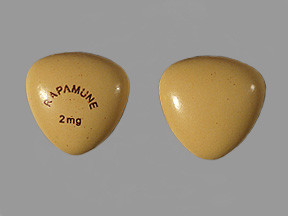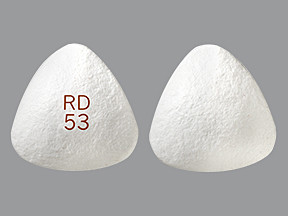SIROLIMUS - ORAL
PHONETIC PRONUNCIATION: (sir-OH-li-mus)
COMMON BRAND NAME(S): Rapamune
GENERIC NAME(S): sirolimus
Uses
USES: Sirolimus is used with other medications to prevent rejection of a kidney transplant. This medication belongs to a class of drugs known as immunosuppressants. It works by weakening your body's defense system (immune system) to help your body accept the new organ as if it were your own. Sirolimus may also be used to treat a certain lung disease (lymphangioleiomyomatosis-LAM).
How to use SIROLIMUS - ORAL
HOW TO USE: Read the Medication Guide provided by your pharmacist before you start taking sirolimus and each time you get a refill. If you have any questions, ask your doctor or pharmacist. Take this medication by mouth as directed by your doctor, usually once daily. Swallow this medication whole. Do not crush, chew, or split the tablets. If you have nausea or an upset stomach, you may take this medication with food. However, it is important to choose one way (with food or without food) and take this medication the same way with every dose. Consult your doctor or pharmacist for more details. The dosage is based on your weight, medical condition, laboratory tests (such as sirolimus trough levels), and response to treatment. Take this medication regularly to get the most benefit from it. To help you remember, take it at the same time each day. Do not increase your dose or take this medication more often than prescribed. Your condition will not improve any faster, and your risk of side effects will increase. Also, do not stop taking this medication without consulting your doctor. If you are also taking cyclosporine, take sirolimus 4 hours after your cyclosporine dose. Consult your pharmacist for more information. Avoid eating grapefruit or drinking grapefruit juice while using this medication unless your doctor or pharmacist says you may do so safely. Grapefruit can increase the chance of side effects with this medicine. Ask your doctor or pharmacist for more details. If you are taking this medication to treat LAM, tell your doctor if your condition worsens.
Side Effects
Precautions
Interactions
Overdose
Images
Reviews
Faq for SIROLIMUS - ORAL
Sirolimus oral is primarily used to prevent rejection in organ transplant patients. It may also be used in the treatment of certain types of cancer and vascular malformations.
Sirolimus oral belongs to a class of medications called immunosuppressants. It works by suppressing the immune system, preventing it from attacking and rejecting the transplanted organ.
Some common side effects of Sirolimus oral include mouth sores, diarrhea, nausea, vomiting, acne, and swelling of the hands or feet. It may also increase the risk of infection and decrease the body's ability to fight off infections.
Yes, Sirolimus oral can interact with several medications, including other immunosuppressants, antibiotics, antifungal drugs, and certain seizure medications. It is important to inform your healthcare provider about all the medications you are taking.
Sirolimus oral is usually taken once daily, either with or without food. The dosage may vary depending on the specific condition being treated and individual response. It is important to follow the instructions provided by your healthcare provider.
Yes, Sirolimus oral may increase the risk of certain infections and may have harmful effects on an unborn baby. It is important to inform your healthcare provider if you have a history of infections or if you are pregnant or planning to become pregnant.
The time it takes for Sirolimus oral to work can vary depending on the individual and the condition being treated. It may take several weeks to months to see the full benefits. It is important to continue taking the medication as prescribed and not to stop abruptly without consulting your healthcare provider.
Sirolimus oral may be used in children for the prevention of organ rejection in certain cases. The dosage and safety profile may vary for children, and it is important to consult with a pediatric specialist for appropriate dosing and monitoring.
If you miss a dose of Sirolimus oral, take it as soon as you remember. However, if it is close to the time for your next dose, skip the missed dose and continue with your regular dosing schedule. Do not take a double dose to make up for a missed dose.
Warning
WARNING: Sirolimus lowers the body's ability to fight an infection/disease (immunosuppression). This may increase your risk of developing an infection or certain types of cancer (such as skin cancer, lymphoma). To reduce the risk of these serious side effects, take this medication at the lowest effective dose as directed by your doctor. Keep all medical and laboratory appointments. Tell your doctor right away if you develop any of the following: unusual skin changes, change in the appearance/size of moles, unusual growths/lumps, swollen glands, night sweats, unexplained weight loss, signs of infection (such as sore throat that doesn't go away, fever). Sirolimus is not recommended for the prevention of rejection of liver or lung transplants because it has rarely caused very serious (possibly fatal) liver/lung problems in those cases.
Disclaimer
IMPORTANT: HOW TO USE THIS INFORMATION: This is a summary and does NOT have all possible information about this product. This information does not assure that this product is safe, effective, or appropriate for you. This information is not individual medical advice and does not substitute for the advice of your health care professional. Always ask your health care professional for complete information about this product and your specific health needs.



No Reviews Yet